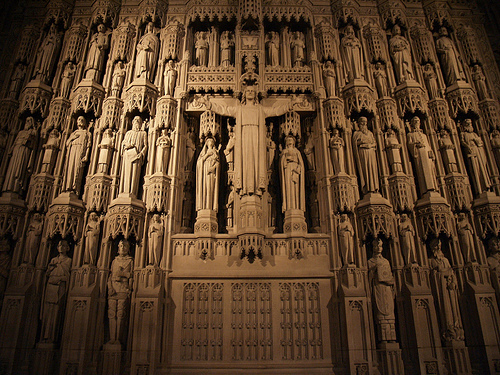The church is the church is the church. Right? Ecclesiology is the study of what the church is. At our present hour, one cannot study the church without hearing the word 'inclusion.' In books, sermons and articles people consistently write and speak about a need for greater inclusion. For many Christians, being inclusive has become synonymous with being a Christian. In fear of losing what they think or claim is church, groups have formed within congregations and denominations to push for full inclusion.
The salvation of institutions through greater inclusion is of the highest priority. With church after church and denomination after denomination declaring they are now fully inclusive, many believe that the church is finally being saved or as one of my friends put it, "...we are moments away from full inclusion in the church." Unfortunately, I think it all might be a trap.
Not far from our home, there is a road with nine churches in a row on it. Driving down the road, I passed building after building of every major Christian denomination. After some prayer for guidance, I realized that these spaces were not really churches. When Jesus placed his person with the least of these, Jesus located the church outside of walled institutions of safety and comfort. In staring at each building and thinking about the denominations, I realized that these spaces exist for the comfort of the members.
For within each building and broader denomination, walls are erected to keep people safe and any interaction with the real church in the streets is carefully scripted and limited. The walls of these buildings and institutions that people thought protected them are really the walls of prisons that keep them from being with marginalized and oppressed people or where Jesus actually is. The message of Jesus calls for a radical ecclesiology or a bold understanding that the church is always going to be in the streets with those we call dangerous or other.
For far too long, Christians have defined the church based on buildings and denominations. There is a desperate need for radical ecclesiology. Jesus was never about the project of institutional upkeep. Jesus was about the people. Jesus will always be about the people. With battles raging for inclusion, one has to begin to wonder if inclusion is worth the energy?
Jesus warned us about a time when inclusion would actually mean exclusion or when being a part of the comfortable would mean not being with Jesus. Do our efforts at inclusion mean that we are leaving Jesus for comfortable prisons? Even if it costs us inclusion in the very churches and denominations we love, we are called to be excluded and stand with those who are standing alone.
Amen.

